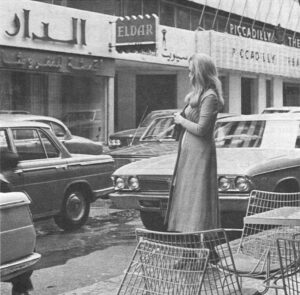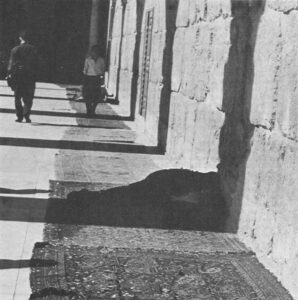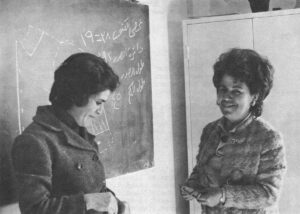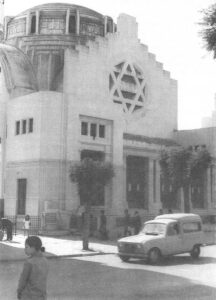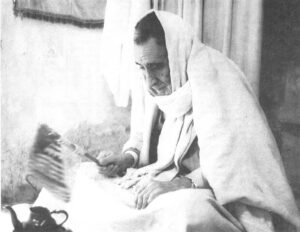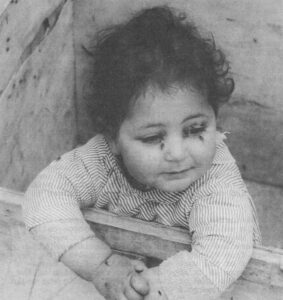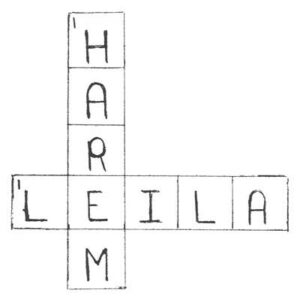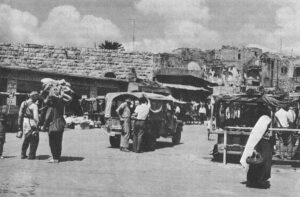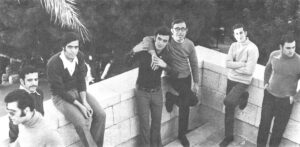December 1970
Hamra is a cross between Main Street, U.S.A., and Rome’s Via Venetto plus more neon, bazazz, and clamor. Signs are in English or Arabic transliteration – not translation – of the English reads “Splendid Store;” and its “Famous Hamburgers.”
Girls flutter by in Paris’ latest fashions (except if it is after eight at night when few respectable Lebanese females go in public unescorted). Even in early winter coats are unnecessary. Minis – not just short skirts but honest- to-goodness minis predominate. A few clotheshounds swelter in Europe’s winter midis. Fashionable men wear tight fitting pants and bodyhugging patterned shirts.
Hamra traffic is always congested. Motorists’ eyes wander from the road to the sidewalk parade of minis. And cabbies spotting a potential fare slow down and toot their horns. Since Hamra is full of promenaders, everyone could be a customer; and the result is an endless stream of pure, unadulterated noise. (One amateur anthropologist speculated that this cacophony results from Beirutis demonstrating they have become citified and left the quiet desert behind. The minarets equipped with public address systems for the muezzins are another illustration of this phenomenon. And in fancy dinner clubs, the higher the menu’s prices, the larger the band’s amplifier.)
A Beiruti sitting long enough at El Dorado or The Horseshoe or Whimpy’s – several Hamra Street sidewalk cafes – will eventually meet an acquaintance. The men automatically and simultaneously flash smiles, nod, bow heads momentarily, and place their right hand over their hearts. This procedure signifies respect and greetings.
Discussion may begin with politics or art. But greater gusto is devoted to gossip. A beauty walking her white, clipped poodle strolls by. And a “gentleman” explodes to his companions, “My God, some of those girls should go to finishing school to learn how to apply their eye make-up properly or what is the best cut midi. And if she’s going to spend so much of her father’s money and so much time on herself, why doesn’t she have her nose fixed? My wife wanted me to have a nose ‘job,’ but I only had a tooth capped.”
Plastic surgery, he proclaims, works wonders not only for one’s appearance, but for one’s sex life as well. “Why take Mrs. Ahmad Muhammad. She must be at least 55, but since her face-lift, she doesn’t look a day over 35. And now she has a lover whom she visits every afternoon at 4:00. You simply must see her drive up in her new midi, boots, and face!” The chatter trails off to a new subject – or object – “who’s from a very nice family – a countess of some sort from Italy” or another femme fatale who used to date Omar Sharif.
Variations on Hamra Street society are repeated in bars, nightclubs, restaurants, and “stereo” clubs, throughout Beirut. Hamra is more for daytime and early evening entertainment; Rue Phenicie (Phoenicia), which features a row of about 25 bars in just two blocks and oriental “dancers” at the fancier clubs, has its rush hour between 9:00 p.m. and four in the morning. Each club has a different clientele. One club stays open twenty-four hours a day and caters to Western engineers and businessmen week-ending away from jobs in the puritanical wilderness of the Arabian peninsula. The owner of the club explains that his clients “eat, drink, play, doze for a few hours, and shave without ever leaving the bar for days.”
Western tourism has been off in Beirut since the June 1967, war and particularly since this summer’s hijacking and cholera scare. But Arab visitors and Beirutis themselves keep the neon glowing and the cash registers ringing.
Much of Beirut’s income comes from serving as oasis far the Middle East- watering spot and transit point for capital from the Arab – especially the oil rich – hinterland. The money is big; it comes and goes easily; it never flows regularly. This might be one reason why a Hamra Street celebrity says that in his hometown, “If you have a dollar, you’re worth a dollar. That’s all that counts here. No matter where or how you got it.” For example, a celebrated Lebanese lawyer brags about “my client, a Chicago gangster arrested in Lebanon for smuggling hashish.” Over cocktails, members of Beirut’s “elite” drop the name of the Western businessman with a beautiful, young wife and shiny car (the two serve equally as status symbols), who is making large sums of money selling arms to the Palestinian commandos.
“HAMRA STREET is like a movie set,” commented a Palestinian artist whose studio is in the neighborhood. Beirut is an Arab city in Western dress. Appearances – including people speaking English or French almost as fluently as Arabic – are deceiving.
Even the most westernized Lebanese is torn between the two worlds – East and West. One well-traveled and educated citizen considers himself a member of a “lost generation, whose only refuge (though temporary) is in spending, money on new cars, new clothes, or new sex partners.”
“The bastards” of Eastern and Western civilization another Arab calls his contemporaries – himself included. He related the first time he went abroad and was thrilled at the thought of a French porter – a Frenchman! – carrying his bags. And when he returned from his first trip to America, he wore only Arrow shirts. Now, he quickly adds, he rejects them and the bright colors his Long Island and Miami Beach friends wear. But he rejects them not in favor of Arab dress, but rather for Italian designs. His Sunday afternoon cafe-sitting ensemble was accented by a multi-colored cravat.
This well-known member of Beiruti litterati cherishes his traditional Arab heritage in the way a connoisseur cherishes a fine piece of antique, crystal stemware. It is beautiful to look at but too fragile to use.
He brags that Arab traditions have guarded against Lebanese hippies. He marvels at the poetic contradictions in his comrades’ personalities, which mix ideas from the East and West, the traditional and the modern. Pointing across the table to his friend dressed in a purple pants suit and sipping campari, he exclaims, “She’s in her thirties, speaks four languages, studied in Europe, and makes her own living. But she cannot live with the man she loves because it would “kill” her father, who lives hundreds of miles away. That’s the Arab in Beirut,”
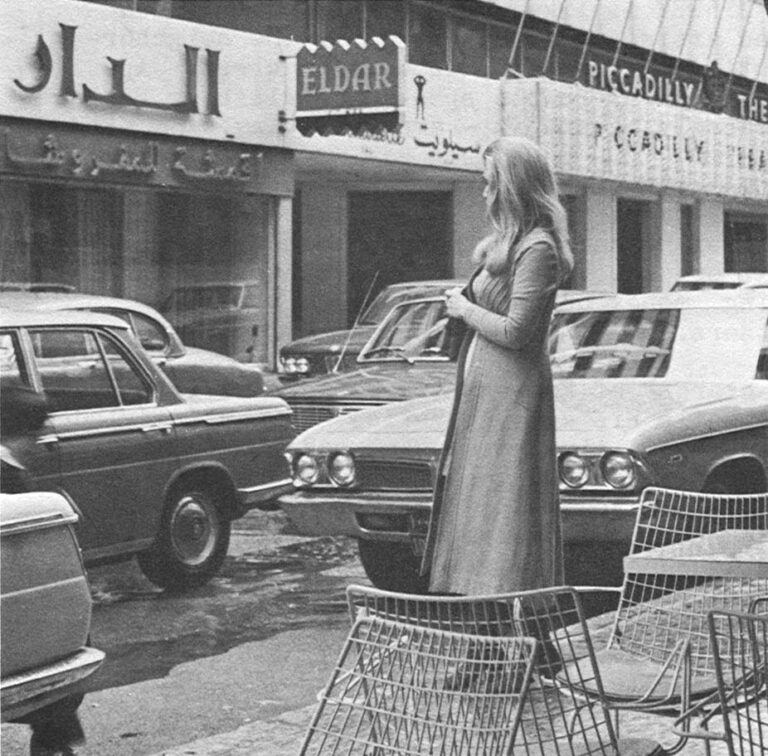
Wipe away the Western veneer, which Hamra Street and Rue Phenicie epitomize, and the deep-rooted oriental nature of Beirut’s middle-class is discovered. Behind the public facade, Beirutis at home with the family seem “at home” with this life. Contradictions and ambivalence cease – at least temporarily.
The family is the basis of Arab society. It influences every aspect of life. Insurance, for example, is not institutionalized as in the West; in adversity, sons, parents, and even cousins are expected to help automatically according to their means.
Although Beirut’s large middle class consumes conspicuously; its home-life is unpretentious. Most are apartment-dwellers. The four to sixteen floor apartment buildings feature porches, terraces, and tile floors a la Mediterranee. Floor plans are similar to those in America except that space devoted to preparing for and entertaining guests – kitchen, salon, and dining room – is larger and used more often. And in the front part of even the most modest apartment, there is a sink where guests can wash their hands without walking to the bathroom located in the private sleeping area.
Decoration and use of space reflect actual income. One family of six lives in a two and one-half bedroom apartment and uses the dining room for sleeping. The furniture is well worn. The television bet and several mass-produced landscapes on the wall are the only luxuries. Most of the income goes for children’s education in private, preparatory schools and the American University of Beirut. In the same size apartment down the street, lives another family with only three children, all of whom are college graduates and self-supporting. They have recently purchased a chandelier and heavy, Spanish style living room furniture.
In the same neighborhood, there are two separate Lebanese families who had lived in Egypt until the 1961 Socialist Decrees threatened nationalization of their property. They still live in luxury and employ servants. Their spacious homes include salon, dining room, and sitting room decorated with gold and white, French provincial chairs; over-stuffed sofas and huge, glass-covered, mahogany tables and sideboards. In baroque frames hang original oil paintings of wise old men or radiant maidens. Silver ashtrays and crystal accessories abound.
The most important family hour – or rather hours – is the mid-day meal. Members of the immediate and extended family drift in and out. Often grandmother serves the meal when she is the only family member not employed outside. (And she often cares for her grandchildren if both their parents work.) Extra food is usually on hand in case of unexpected – but always welcome – guests.
A typical meal includes everything from cucumbers to cabbage pickled and paste-like preparations from eggplant (baba ghanough or chickpeas (humus), which are scooped up with flat Arab bread. Romaine lettuce leaves are scoops for tabouli – a salad made from finely chopped parsley, mint, onions, tomatoes, cracked wheat, lemon juice, and olive oil. Kibbeh is extra fresh meat, chopped, mixed with crushed wheat, and shaped and cooked in various ways. Desert is fresh fruit.
The evening meal is late and light – often little more than cheese, other milk products, and bread.
Late afternoon and early evening are visiting hours for friends, who sit talking for hours about nothing in particular. According to traditional protocol, the hostess does not necessarily ask what a guest would like to drink. She serves what she feels the occasion calls for – fruit juice, sweet tea, or – most often Turkish coffee. If it is a special time, there is baklava and chocolate bonbons or both. A polite guest never refuses his hostess.
Newcomers from the West are easily misled by Beirut’s modern facade and mistakenly expect to find a Western style of life. Although Levantine life may never be fully fathomed – even by the Levantines themselves, strangers to Beirut are well advised to learn the following:
Beirut is not a city; it is an overgrown village. To locate a building, the street name and number is useless. Street names – if they exist at all – are rarely known by the people who live there. One visitor spent two hours in a taxi searching for a friend’s house. He knew the address and the name of the building, but neither the cabbie, the police, nor people in the neighborhood had heard of the street. It turned out that they were on the street all along.
Rather, a typical Beirut address reads: “Mr. Ahmad Muhammad, Dumit Building… two doors down from the Saudi Embassy, turn up Rue Bliss [Directions usually say to turn “up or down” a street depending on the direction of the traffic, not to turn “right or left”]…Walk ten meters… pass Mr. Ghandour’s bakery… and you’ll find Mr. Muhammad’s apartment on the third floor.” A clever American in Beirut decided to save his breath and print maps to his home instead of calling cards.
If you find yourself lost and late for an appointment, don’t worry. No one is expected on time. Sometimes, you are not even expected to keep the appointment at all. If someone says, “I’ll call you this week,” do not sit home waiting. That’s just a courteous way of saying, “I’ll be seeing you.” If you are really anxious to see someone, you may find yourself bargaining for time as if you were in an oriental bazaar:
“Call on Monday morning,” he says.
“Can’t I call on Saturday,” you ask.
“Okay. Noontime Saturday,” he concedes.
When you call Saturday noon, you are told to call back at four in the afternoon. When you call back, someone answers the phone and tells you that the man you want to see has gone home and can’t be reached until Monday morning. So you are back where you started when you began bargaining. The buyer beware.
Often, however, there is no phone or the telephone system is out of order. And leaving a message is one thing; getting the message to the person intended is another thing altogether. If you ask to leave a message and the operator tells you that she won’t be seeing Mr. Muhammad, believe her. Things are done on a face to face basis; if she doesn’t see Mr. Muhammad, Mr. Muhammad doesn’t get your note. Just leaving – i.e. not having the note delivered personally – is useless.
One American lived in a building in Beirut for a month. But when people called for him, the receptionists repeatedly replied that no such person lived there. What was that Westerner doing wrong? He had not established that vital personal contact with the operators, concierges, etc., who collectively are Beirut’s lines of communication.
The primary rule for a newcomer is: To meet someone you must know someone. Nothing is done impersonally or anonymously. Without a personal recommendation, walking into an office and requesting an appointment with someone is as difficult as crossing the Sahara in the summertime (without a camel.)
Once you get to know a person, however, and tell him what you are doing, he inevitably volunteers to introduce you to every cousin or friend who might be able to help you.
And the next day, he will invite you to his home to meet his family.
Received in New York on December 7, 1970.
©1970 Paula Stern
Paula Stern, a free-lance writer, is an Alicia Patterson Fund award winner. This article may be published with credit to Ms. Stern and the Alicia Patterson Fund.

